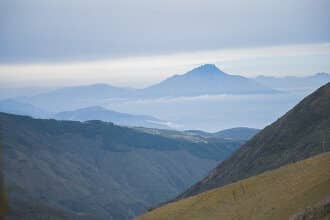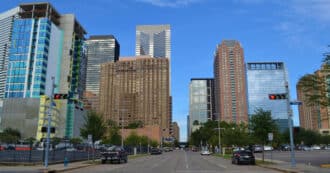The Emergence of Rights of Nature (RoN)
By Alina Sterenfeld – Typically, when we think of legal rights, we envision the rights between people and their government. But what about rights regarding the environment? In recent years, a new legal strategy known as the Rights of Nature (RoN) has emerged, aimed at protecting the environment from the threats of climate change, pollution, and overdevelopment. The fundamental premise of this legal strategy is to recognize nature as independent from human use, and thereby grant it power, through the guardianship of local communities, to safeguard itself from harm.
Recognizing Nature’s Independent Rights
The concept of nature having its own rights originated from the writings of Christopher D. Stone. In 1972, Stone, a then-professor at the University of Southern California published a paper titled “Should Trees Have Standing? — Toward Legal Rights for Natural Objects.” It is in this article where Stone proposed “that we give legal rights to forests, oceans, rivers and other so-called ‘natural objects’ in the environment.”
Shift in Human-Nature Relationship: Industrial Revolution’s Impact
Stone argued that nature is worthy of legal personhood status once we cease viewing nature as property. This perspective of humans looking to nature as property is a phenomenon which is relatively recent. The core relationship between humans and nature drastically changed during the late 18th century with the Industrial Revolution.
Rather than living with the land, humans began living on top of the land, inherently separating themselves from their surroundings, looking to the earth as a source of extraction, exploiting it for personal use such as energy, timber, and minerals. Because of this break in the relationship between humankind and nature, the environment has remained at great risk, so that the majority of legal systems classify nature as a commodity for human use, leaving it vulnerable to irreversible degradation.
RoN Concept Rooted in Centuries-Old Religious Ideas
If a person can sue for personal damages, why can’t a river? To clarify, RoN are not equating rivers to humans. But, they are equating rights of protection which humans possess to the rights of protection which rivers should also possess. The idea that nature is an entity on its own, and has to be protected, dates back to centuries-old religious ideas.
Biocentrism vs. Theocentrism vs. Anthropocentrism
In chapter 20 of Deuteronomy, God commands “When you besiege a town for many days, waging war against it you are not to bring ruin upon its trees.” Rashi, a highly influential, medieval Jewish scholar on Biblical liturgy, explains that trees are merely “innocent bystanders” during war, and cannot hide or run away. We are not permitted to cut down trees, for trees have a purpose and life of their own, entirely separate from their use for humans. We need to take exceptional caution as well, because trees cannot defend themselves against destructive human intentions and technologies.
Here, Rashi takes a biocentric view, where nature, and all living organisms hold moral consideration. In biocentrism, nature was not only created to serve the needs of humans, but serve an independent purpose on this earth and thus have inherent value. This perspective of nature having inherent value is similar to the view of theocentrism, or the belief that God is the absolute center of the universe.
In theocentrism, God, who is above both humans and the ecosystem created a world for harmonious coexistence between humankind and nature, imparting the role of steward on humans. On the other end of the moral, philosophical spectrum is anthropocentrism, or the belief that humans are the central entity of creation, and thus humans alone, and not nature, possess intrinsic worth. All other creations are only as worthy as their use for humans.
RoN Implementation Worldwide: Ecuador’s Landmark Case
In a world where many people harbor an anthropocentric view, trees indeed become “innocent bystanders” in need of protection: not only in the physical realm, for trees have no legs to run and hide, but also in the legal realm, as they have no legal standing to protect themselves. Humans do not ask permission to drill into the earth, and the ecosystem has no say when they do.
The RoN changes this. The RoN has been gaining momentum on an international scale, and has even been actualized in many legal systems throughout the world. Most notably, in 2008, Ecuador became the first country to codify the RoN into its constitution. Other countries have followed suit, including Bolivia, Colombia, and New Zealand.
Challenges and Ambiguities in Practical Application
Critics highlight the major challenges to the RoN which primarily include the ambiguity of its practical application. In 2021, however, the RoN transitioned from theoretical and symbolic law to a very concrete one.
Enami EP, which is the national mining company of Ecuador, held permits to begin mining in 68% of Los Cedros forest. Los Cedros is a region in northwestern Ecuador home to great biodiversity such as dozens of rare orchid species and the brown-headed spider monkey, one of the world’s rarest primates. Outraged by the environmental destruction that mining would cause, the people of Cotacachi, a town located near the Los Cedros forest, brought a legal case in opposition to Enami EP.
In December of 2021, The Ecuadorian Constitutional Court made a landmark ruling in favor of the Los Cedros Forest and deemed that the mining was unconstitutional, as it would harm the biodiversity of the forest, and thus, violate the RoN. This ruling turned the brown-headed spider monkey from an “innocent bystander” to an entity with a voice and the legal ability for self-preservation.
The RoN are pivotal to global ecological preservation. We must fight for our planet by reverting to living with nature, and not just on top of it, and create long-lasting change in our hearts, our behaviors, and our legal system.
*Featured image source







